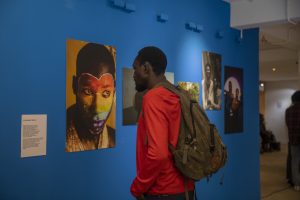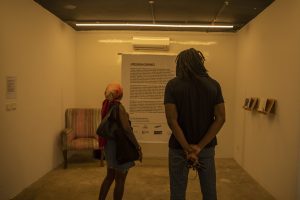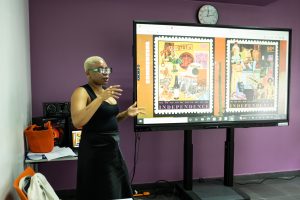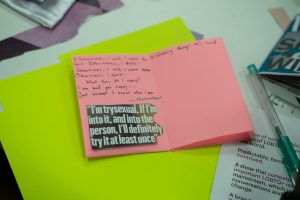The Art of Resistance: Illuminating a Hopeful Queer Future for Nigeria
“A Wa Nibi means we are here...There’s nothing you can do about that.”
“A Wa Nibi means we are here...There’s nothing you can do about that.”
“A thing being forbidden did not make it extinct; that, in fact, bans only created black markets,” Eloghosa Osunde writes in one of my favourite quotes from her celebrated 2022 novel, ‘Vagabonds’, a seminal feat in telling imaginative stories significantly centred on the triumphs and travails of queer people, in a society that squeezes far beyond the margins every single day.
In Nigeria, the Same Sex Marriage Prohibiton Act (SSMPA) ensures that any “act” of homosexuality is punishable by 14 years of imprisonment. However, criminalising people’s existence doesn’t mean they stop existing. It only means they create spaces where they can live, free from prying and judgemental eyes.
My city, Lagos, is yellow. Imagine yellow buses with barely hanging doors covered in tattoos of toxic positivity phrases that promise drivers a better future. Yellow, as in “Keke” tricycles that fight for road space with buses on highways and drive without fear in pedestrian walks like they own the roads. Yellow taxi cabs people only use when they’re desperate and rich enough to part with more money than they’re worth. But as a queer person in a country that swears we’re not real, I see more colour than the sun reflects. Whether it’s through our expression of self with our fashion choices that break gender barriers, our bold call to action online for a better future for queer people, or their creation of books, films, and music that document our existence, LGBTQ people in Nigeria keep finding a way to show the world that we exist.
In a country where the LGBTQ+ community often faces marginalisation and discrimination, a three-day art exhibition titled “A WA NIBI” – the Yoruba declaration for “We are here!” – was held earlier in the year, to envision a bold and inclusive future for queer individuals in Nigeria, comprising a series of workshops, panel discussions, and performances. This event, curated by the visionary artists and activists team of Obodo, in collaboration with Kampnagel, aimed to challenge societal norms and ignite conversations about acceptance, equality, and the power of artistic expression.
The art exhibition was a vibrant display of creativity, featuring diverse artworks that celebrated the complexities and beauty of queer experiences in Nigeria. From captivating paintings to thought-provoking installations, each piece was a powerful catalyst for introspection and dialogue. By showcasing the artistic talents of queer individuals, the event aimed to challenge stereotypes, dispel myths and foster societal empathy.
View this post on Instagram
Art will always be a potent vehicle for social change; this exhibition was no exception. It provided a platform for artists to express their authentic selves and communicate the struggles, joys, and aspirations of the queer community. Through their artwork, they shattered the barriers of silence and fear, inviting viewers to engage with their stories on a profound level. The exhibition challenged conventional norms, asking society to question preconceived notions and embrace a more inclusive and compassionate future.
A WA NIBI featured work from artists like Yagazie Emezi, Rachel Seidu, Alexandra Obochi, Va Bene (CrazinisT Artist), Emmanuel Ndefo, Sabelo Mangeni, Oluwatamilore Osho and Nwaobiala. Notably, the accompanying talk sessions during the event sparked vital conversations among attendees. Experts, activists, and members of the LGBTQ+ community came together to discuss “Queer(y)ing the archive,” and the importance of documenting challenges faced by queer individuals in Nigeria to ensure that our art, history and lived experiences are not buried by the society we live in.
These discussions elaborated on an earlier focused group discussion, which aimed to explore queer language in Nigeria, the terms the community speaks in secret pockets of the world to make themselves feel seen and heard. It was essential to document these as a way of archiving and documenting queer history in Nigeria. By having these conversations, the event stimulated a broader understanding of the struggles faced by the queer community and highlighted the urgent need for change.
The three-day art exhibition and talk on a queer future in Nigeria served as a powerful testament to the resilience and creativity of the LGBTQ+ community. The final day was a Zine workshop titled “Fantastic Queer Futures,” taught by Chizzi, an interdisciplinary artist, designer and researcher, whose work centres on the specificities of Igbo, Nigerian and African experiences and histories. The class helped queer people use their imagination to create a future where their lives weren’t criminal.

Through events like these, queer people are boldly challenging societal norms, demanding acceptance, equality, and freedom of expression. A WA NIBI was not just about art; it’s a call to action, urging queer Nigerians to live boldly and push for diversity within their society.
To build a queer future in Nigeria, we must engage in open conversations, challenge prejudice, and actively work towards dismantling discriminatory structures. Art has the extraordinary ability to ignite dialogue and inspire change. By supporting and amplifying the voices of queer artists, we take a step closer to building a society where every Nigerian can live their life boldly and authentically.
This transformative event showed the importance of harnessing the power of art and the spirit of inclusivity to reimagine a Nigeria where diversity is celebrated, love knows no boundaries, and everyone has the freedom to embrace their true selves. The time for change is now, and it is up to all of us to create a future where queerness thrives and every Nigerian can live their life with pride.
View this post on Instagram
In a conversation with Matthew Blaise, a member of the organising team for A WA NIBI, we spoke about the reason why this project needed to happen and their plans for archiving the stories shared.
NATIVE: What does “A WA NIBI” mean?
Matthew Blaise: A Wa Nibi means we are here. It was a means to establish our existence and say fuck it; we are here. There’s nothing you can do about that.
I noticed the exhibition focused on mixed media to convey its message. Why did you decide on that?
These were artists I’ve followed and respected for a long time. I find their works very inspiring. These are works thousands of people have seen and felt represented by, but it was important that people in our community could see them too. The idea was for these works to reach out to every and any Queer Nigerian to remind them just how here we are, and it all tied in perfectly. It was also vital that it focused on the works of queer artists in one room, for us, with their message not being mangled to fit a narrative that suits a heterosexual audience. The centre of all this was queerness, and people needed to enjoy the art through a queer lens.
How long did it take to make this happen?
In 2021 I was contacted by the team at Kampnaga to join this collective project. It took two years of waiting, reaching out to the artists and applying for funding, and here it is now. It wasn’t as easy as that, but I’m grateful to be the vehicle through which this exhibition happened. All that mattered was that we got to boost the lived experience of queer Nigerians with this, and that’s what kept me going.
What’s next after these three days?
So while it’s essential for the people who the work was done for, who experience these struggles to interact with art that sees them, it’s also crucial for the world to see it. The exhibition also happened in Germany, where a new audience saw them.
Are the pieces being exhibited for sale?
No, they’re all for exhibition only.
So this wasn’t intended for monetisation?
No, not at all. It’s all to showcase the works of these incredible artists; even entrance to the event was free. It was all supposed to be accessible.
That’s amazing. What happens next?
Well, the final and most important aim was to develop a digital glossary of languages queer people use to interact and carve out spaces for themselves. We hope this gives us access to a community that trusts us so there’s proper documentation of our existence and experience.



All Images By Nengi Nelson.
Malakai Bassey is a pop culture writer, an art enthusiast and a semo apologist. They’re a multimedia storyteller interested in telling stories of people who don’t find themselves interesting. They were raised by TV, so their current personality is their favourite character from whatever show they watch.

